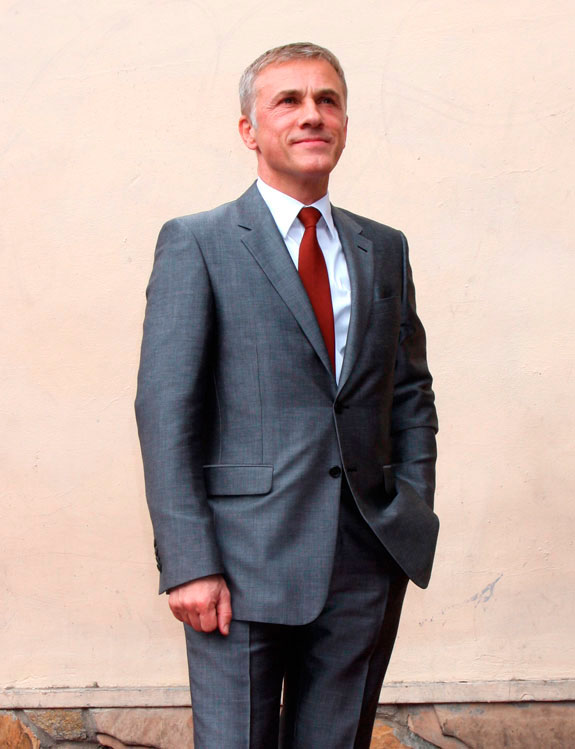Christoph Waltz – Charming but dangerous

Bond is back! Daniel Craig returns for the fourth time as 007 in the brand new James Bond film Spectre. The 24th instalment of the franchise – created by Skyfall director Sam Mendes – sees Bond battling a criminal syndicate led by Franz Oberhauser, played by Christoph Waltz. Meanwhile, Naomie Harris is back as Miss Moneypenny, Ben Whishaw returns to play Q and Ralph Fiennes is once again M. New members of the cast include Bond girls Monica Bellucci, who plays Lucia Sciarra, and Léa Seydoux, who stars as Madeleine Swann.
Oscar-winning actor Christoph Waltz talks about playing a Bond baddie, how it feels being part of the Bond family and what we can expect from the latest adventures of 007.
Christoph, you seem very charming, just like your character in the movie…
“Charming but dangerous!”[laughs]
So how does it feel to be a part of the Bond family?
“It feels wonderful because it really is a family situation. And it’s because I have an oddly theoretical nostalgia for the old patriarchal studio system, not that this is a patriarchal studio, but it is a very big company with very strong family aspects. Of course, you know, when you play Bond then I can see you will have the normal and healthy difficulties that you would have in a family. So, interference by your parents [laughs], and trying to free yourself and, you know, go through the whole thing. But I’m just a distant cousin, so it’s fantastic.”
Which is your favourite Bond movie?
“You see Bond is a great, actually if I were to teach a film course or film history or film awareness course, I would use Bond as my topic. Because it started in ’62 and now, 52 years later, we have the 24th Bond movie. We had one every two years or so, not regular intervals. And they change according to the time. But so does our perception. So do I have a favourite Bond movie? Every single one that I saw, because that was the movie of the time and that’s what movies of that kind are all about, to watch our world in this moment with our eyes in this moment. And you can actually depict that idea beautifully in watching all the Bond movies. Because it’s always more or less the same set up, that’s part of the allure. It needs to be the set up. By now the parameters are set. And for that reason, they also need to be fulfilled. You can’t just break it because you would break the Bond idea. And I always liken it to Commedia dell’arte you know, you have these people, you have the Arlecchino and the Brighella and the Pantalone and they all do what they’re supposed to do. So we see right away what’s going on. And they have their very set characteristics. Now that’s popular culture, whether that’s the 18th century or the 21st, that’s a detail.”
Tell us in what way this Bond film picks up the contemporary?
“Well you see it picks up a very, very pressing and urgent topic – surveillance and the manipulation of data. In the ‘60s that was the Cold War, the atomic bomb that the villain had under his cloak was really a pressing and urgent topic of the time. Thankfully, we’re not really so scared of atomic bombs anymore but now we’re scared of… I’m convinced they have a camera somewhere here [laughs]. Who knows?”
You said that Bond gives you parameters and there are certain things you have to keep in there, but how do you then stretch those parameters and keep it exciting for audiences?
“Well by keeping the basic threat, the main obstacle current and up to date. And if you follow that through then the means by which that obstacle is overcome will also change.”
How much leeway does it give you as an actor to fit into this parameter?
“You have plenty. Charles Eames, the designer, said, ‘A designer needs restriction’ because you can’t work without restriction. The restriction actually sets the mode. And even though an actor is really not a designer because the design is already complete, you know, an actor sometimes does alterations to the design, you know, streamline it and say, ‘This is not going to be an airplane, it’s a submarine’. But the basic design should remain the same. But then Eames said,‘If you don’t have a restriction the most important part of your job is to impose it on yourself’. And that’s in a way something that I really try to follow. What’s required? I don’t really believe that abolishing and eliminating limits will give you freedom, and I mean that in every respect by the way. Freedom comes from realising where the limits are and then acting accordingly.
Do you have a favourite Bond villain?
“Gert Fröbe always comes to mind because of his steam engine-like persona. It’s fun. And well, the ‘60s irony and the ‘60s had a different importance in our exchange. I find it regrettable that irony is kind of vanishing or getting a bad reputation, irony now, [whispers] especially in America. It’s clear they don’t get it, I mean not Americans, but the critics of irony feel side-lined because they’re not quick enough. Reading between the lines is out of fashion. You need to get hit over the head. It’s your fault, it’s the media [laughs]. But that’s what I love about this Bond movie, irony is coming back in. Irony is such an important element of Bond and that’s where the more subtle changes are actually interesting, to come back to our film course.”
Would you like to do the next Bond movie?
“I haven’t read the script yet – do you know any details?”[laughs]
But you are the one villain who survives in this movie?
“Who knows? Maybe he dies of his wounds the day after – anything is possible.”
Thank you
TEXT: CHARLOTTE WINTERS | HOTFEATURES I PHOTO: DENIS MAKARENKO | SHUTTERSTOCK.COM
Subscribe to Our Newsletter
Receive our monthly newsletter by email




